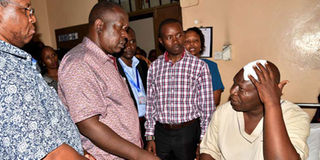Premium
Kilifi leaders differ over ‘disco matanga’ ban

Interior PS Karanja Kibicho, CS Fred Matiang'i and ICT minister Joe Mucheru visit Kilifi County chief David Kahindi (Junju), who was injured in an attack at a disco matanga, January 7, 2019. PHOTO | KEVIN ODIT | NATION MEDIA GROUP
Kilifi and national government officials have differed over a ban on night mourning events popularly known as “disco matanga”.
Governor Amason Kingi and County Commissioner Kutswa Olaka disagreed on whether the mourning families should be allowed to engage in such events.
In 2018, Interior Cabinet Secretary Fred Matiang’i banned the cultural events, blaming them for an increase in early pregnancies and school dropouts and harbouring criminals.
That year, Kilifi County recorded over 13,000 early pregnancies. By January 2019, it had recorded over 17,500.
Speaking in Kilifi town, Governor Kingi asked the government to lift the ban.
“This is a source of livelihood and if we continue being tough on them, those planning such cultural events will be affected,” he said.
He applauded the move by the disco planners to come together and bring on board the two levels of governments for an amicable solution.
He warned parents against allowing their children to attend disco matanga events.
But Mr Olaka dismissed the county boss, saying no disco matanga would be allowed.
“It is better to be called names but not be in agreement with those playing disco matanga and destroying the lives of our children,” he said.
He said the discos have affected the 100 per cent transition from primary to secondary school.
He said girls as young as 12 years attend the discos and later become pregnant, dropping out of school.
“Even though we force them to go back to school, after giving birth it proves difficult for us to follow up on their cases,” Mr Olaka said.
National Council of Churches of Kenya (NCCK) Kilifi branch vice-chairperson Bishop Reuben Katite observed that families had stopped attending disco matanga during the Covid-19 pandemic.
“But the events are back and families are taking bodies from the mortuary and having overnight vigils. My appeal is to the people of Kilifi to stop entertaining disco matanga that has brought more harm to our community,” he said.
In 2019, Governor Kingi commissioned a 16-member task force to find out the root cause of early pregnancies in the county.
The team was to release its findings in December 2019 but their report has not been made public.
The disco ban matter was raised in Parliament by the late Rabai MP William Kamoti, who protested that it violated local culture.
Tezo MCA Thomas Chengo argued that the county government had not come up with a policy to address the problem of disco matanga.
He said the directive to ban disco matanga harms the public.
“The public is suffering because there is no alternative way for the community to control disco matanga. We cannot enjoy our rights because when you [play music] at a wedding, the police will come and confiscate the music equipment. We are at a crossroads with the meaning of disco matanga,” he said.





